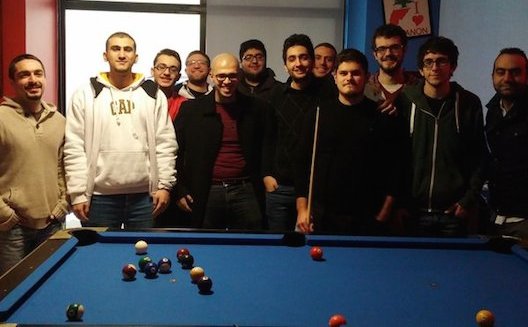Growing Lebanon's gaming scene

The video gaming industry in Lebanon is facing a fresh chapter in 2016 with the introduction of new publisher, Morage Games.

cofounder Mohammad Razian (far left)
and mentor Joseph Saade (far right).
(Images via Morage Games)
The company, founded in January, is the brainchild of Raja Riachi and Mohamed Razian, two gaming enthusiasts with experience in startups and entrepreneurship in Beirut and London respectively.
After meeting at an event at Altcity, a coworking space in Beirut, the two founders came together to form a company aimed at unifying the local game community in Lebanon, promising local computer and mobile games developers, who are unaffiliated with studios, to get their games to market.
Riachi (below) previously worked with Altcity as their gaming community coordinator, and has experience with novice developers eager to break into the sector, whilst Razian studied the culture of tech startup entrepreneurs in London’s ‘Silicon Roundabout’.
What Lebanon lacks
“Scattered is how I would describe the gaming community,” said Riachi. When discussing the present obstacles for designers wishing to develop video games he noted that, “the biggest challenge however is convincing promising developers that there is a future for video games in Lebanon”.

He argued that there was a cultural stigma also, which parents attach to the profession: “they frown upon the idea that their child would work in the video gaming industry.”
Their main role as a company is twofold: develop and unify the community in Lebanon by promoting not-for-profit events that encourage collaboration, and form partnerships with developers looking to remain in Lebanon and publish games, but which lack the resources to do so.
They want to have four games released via these partnerships by the end of 2017, and another four in the pipeline for 2018. But final numbers are dependant on the scale of the games – if larger individual projects materialize they will require more resources.
Morage Games will provide investment, mentorship, PR, marketing and monetization, which both founders identify as a key problem in the video game development process.
“There is a lack of knowledge around the entire process of monetization – there’s a lot to learn,” explained Razian. He said that Morage could address issues such as how to take a game to market.
Expansion
The global industry itself has blossomed over the last few years.
“We’ve been experiencing an indie [game] revolution since 2010,” Riachi said, which he argues has been aided by the democratization of development tools and open publishing platforms such as Steam and mobile app stores.

This means that, theoretically, anyone with a computer and basic skills can publish a game – but often the missing link is the marketing.
The Lebanese gaming sector is small, with only a few publishing houses dedicated solely to video games of original content.
Gamecooks releases mobile games on a regular basis, and Wixel Studios is both working for hire and producing a new mobile app game, which they hope will be released during the MENA Games 2016 conference in April. Another enterprise, Fovea, which was formed from previous gaming company Gamabox, has released the gaming app version of popular board game Triominos, in partnership with Goliath Games.
“It hit the stores in July and he's still very popular, so we're working on updates since then” explained Jean-Christophe Hoelt, the development and design leader from Fovea. “Another game with the same partners is on track for this year.”
In terms of advancing the local gaming community, Morage Games have launched the ‘Arab Arcade’ initiative – a project intent on connecting video game developers through events.
The initiative brought the Global Game Jam to Lebanon for the first time. This worldwide competition tasks participants with creating a video game in 48 hours and takes place in 93 countries. Competitors such as George Habr, feel that the work Arab Arcade does ensures a sense of solidarity amongst local and international gamers.
“Participating in the Global Game Jam this year and submitting our game alongside over 5,000 other submissions from all over the world kind of gave us a sense of belonging,” he explained, as “Arab Arcade put Lebanon on the Global Game Jam map for the first time.”
Future plans
Arab Arcade’s unique selling point, Riachi argued, is its appeal to a wider catchment of people beyond software developers, as the initiative aims to attract individuals to events who do not necessarily have computer skills.

Artists, designers, programmers, writers and musicians are required to collaborate on elements of a game to create a more holistic user experience. “We’re keen on attracting more than just programmers,” said Riachi. “They’re key but they’re not the whole picture.”
In the long term, Razian explained that their publishing company wants to encourage development and gaming community in Lebanon and in the region. “Gamers don’t have the support they deserve and our company is trying to change that,” and further explains that the entire project is self-funded which gives Morage Games the freedom to act without being restricted by the terms of financial backers.
“We’re sussing out people that we feel show a lot of potential, and feel that the support of a strong gaming community is crucial.”
Arab Arcade’s next major event is a one-day game ideation competition that will encourage designers to create and pitch the idea for a video game, and will be held in Beirut on March 19.


